Moving, whether it’s across the country or just a few minutes away, can be a really daunting process. Throw in the added factor of starting your graduate degree, and it can quickly become overwhelming. Luckily, those of us who have done it ourselves can offer a few tips to help you with moving to Boston!
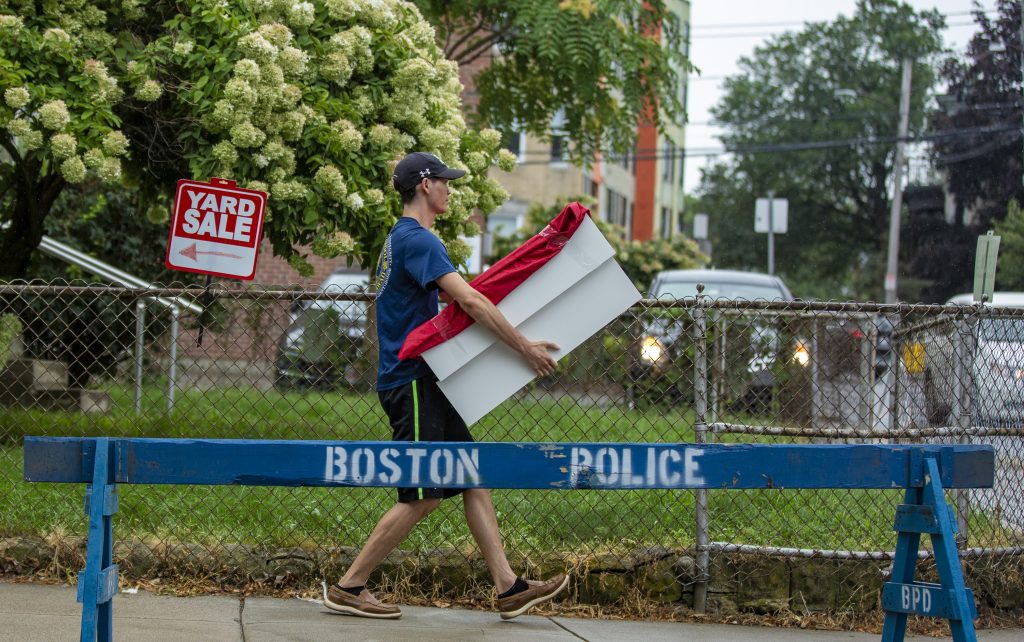
When to Start Looking
It’s almost never too early to start looking into the housing/rental market. As you begin applying to graduate schools, don’t be shy about researching housing. That way, you’ll have some time to get acquainted with the regional market and what’s realistic to expect within your budget, location, and timing of the move.
Ideally, you’ll receive your graduate program acceptance letter with plenty of time to consider all the logistics of moving. Usually you’ll hear back sometime in late March or early April if you’re starting in the fall semester. As soon as you put down your tuition deposit, it’s time to really start looking! Boston is known for its concentration of great universities, so it’s a very heavily student-populated city. This means that many leases tend to open up for new tenants to move in around August-September. On the other hand, the number of students in Boston makes the rental market incredibly competitive, especially in late summer.
For that reason, and to avoid moving on Boston’s busiest move-in weekend (more on that below!), it’s probably best to secure your lease sometime in May or June, with a move-in date at least a week before classes begin. That way, you can settle in to Boston before you start worrying about school work.
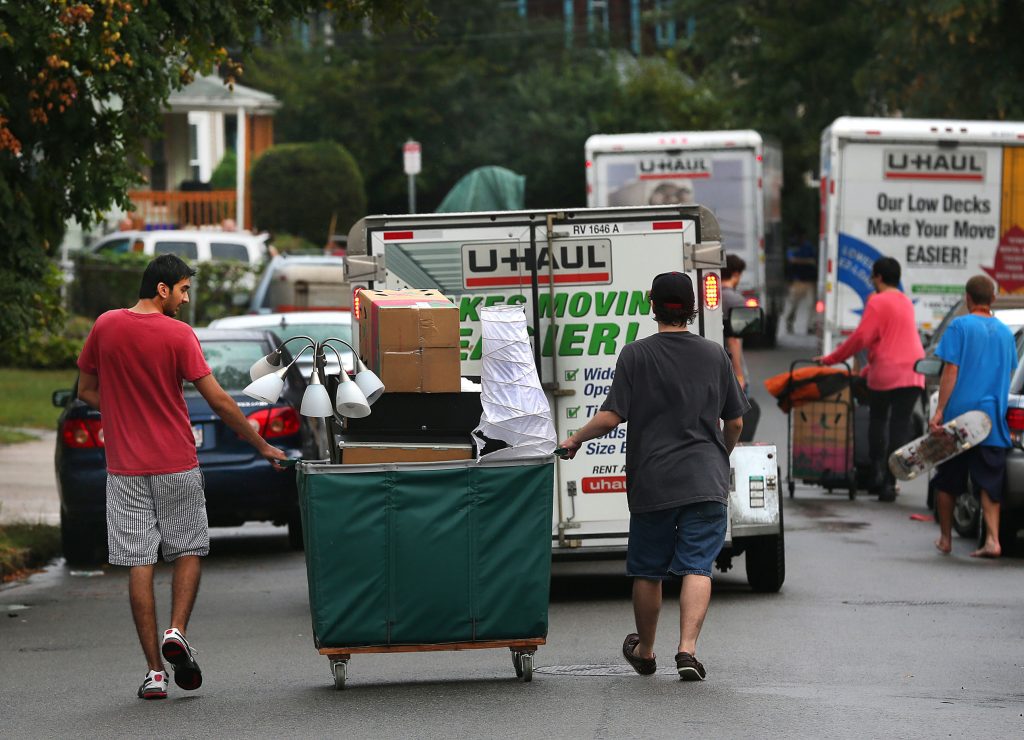
Know Your Non-Negotiables
For many students, the move to grad school has a few more considerations than the move to undergrad. Maybe you’ll be moving farther away, with family in tow. Or maybe you’ll be starting over in a new field, while also trying to support yourself in a new environment. For some, the adjustment to city life (and prices!) can be tough. Whatever your circumstances, be honest with yourself about what you need, versus what you want, from your living situation.
Consider first any hard limitations you might have, like budget and move-in date. Those will be the two major limiting factors on the rental units that are available to you. Keep in mind that Boston’s rental market can have a lot of up-front costs. As someone used to renting in the Midwest, I was surprised at all the fees involved in Boston leases. Between broker’s fees, security deposits, and landlords requiring first and last months’ rent, the initial cost of moving to Boston can be several times the monthly rent.
All that said, there are certainly landlords who are willing to negotiate on some of these costs. They typically make these decisions based on your application, which includes information like your credit score and rental history. You can always look for units that don’t require a deposit, or where the landlord is willing to accept only the first month’s rent rather than first and last. Beware though, if the price sounds too good to be true, it probably is! Rental scams are an unfortunate reality, so keep an eye out for signs that a listing is fake.
Thinking about Location
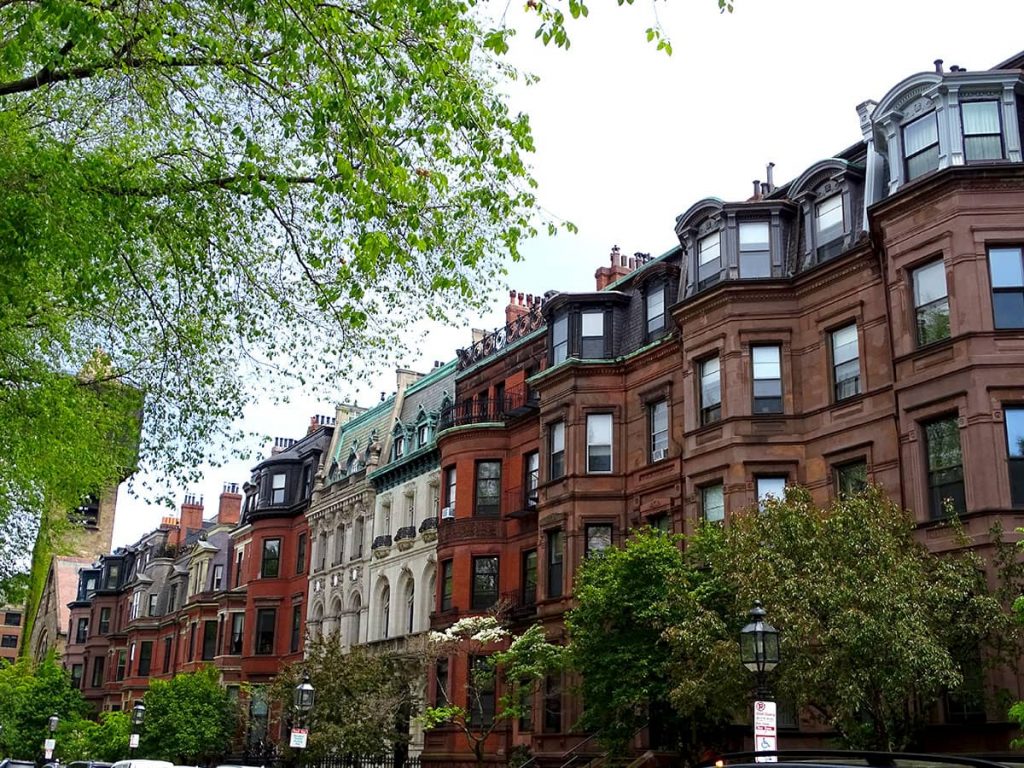
Aside from the financial considerations of moving to Boston, you’ll want to think about day-to-day logistics. Think about where you’ll need to be: Are you commuting to work and then school? Will you have a car, or rely on public transportation? Are you willing to sacrifice the square footage of the suburbs for the convenience of the city? If so, how far are you willing to walk, and what kind of access will you have to the MBTA? If not, do you plan to take the Commuter Rail into the city, or find parking near Boston Common? Once you know your transportation needs, it will be easier to compare neighborhoods and apartments.
Some Insider Tips
An insider tip after a year of living in the city: Boston feels much bigger than it is! If you’re worried about the cost of the MBTA subway (known locally as “the T”) or bus fares, you should know that in the city center, anywhere within a two to three-three stop radius is usually no farther than a fifteen-minute walk. Boston is a beautiful city, so walking in the warmer months can save you some money. During the winter, though, it can get pretty cold, so living close to a bus or T stop is helpful.
If you’re planning to live outside the city for cheaper rent, you’ll want to stick close to the commuter rail. From the commuter rail you can access the T’s Green Line, Red Line, or Orange Line. All three of those lines bring you within a 10-minute walk from Emerson’s campus. Though, as a Green Line rider, I will say that the Orange and Red lines tend to be more reliable.
To learn more about where many of our grad students live, check out our “Where to Live in Boston” series. This page features popular neighborhoods like East Boston, Allston, Jamaica Plain, and more.
Finding Housing Help
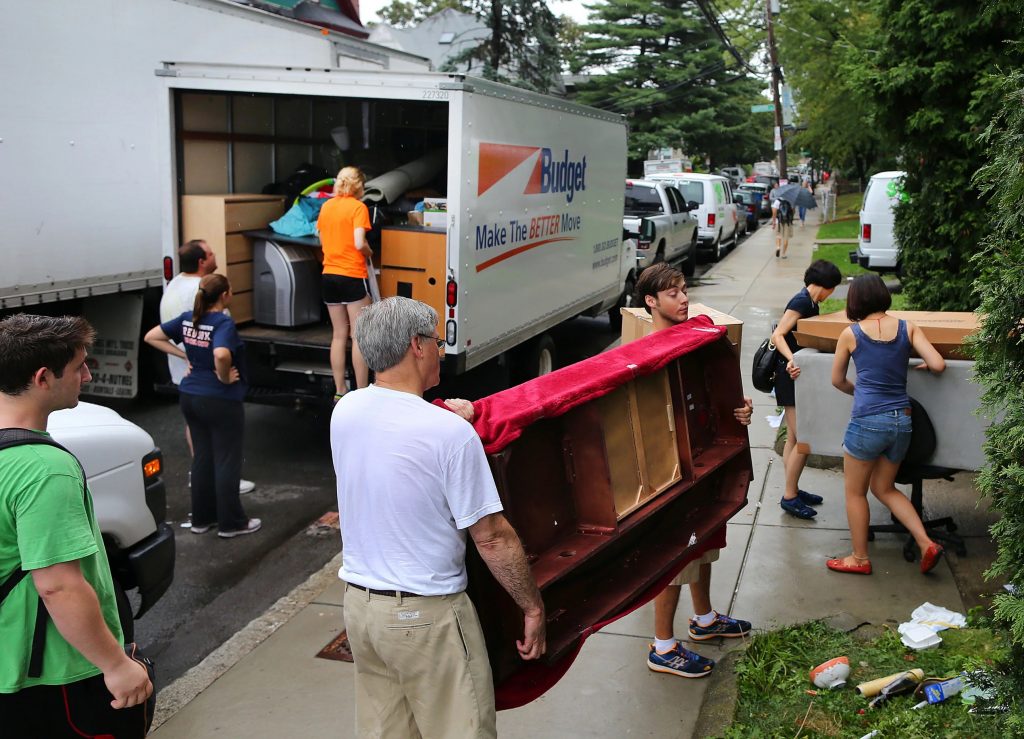
If you’re looking for an apartment on your own, you’re probably already familiar with popular online platforms like Zillow or Apartments.com. These are great places to start, but, as mentioned earlier, it’s always a good idea to verify that the listing is legitimate before you give anyone your personal information, sign a lease, or pay a deposit. You can check that the listing matches the actual licensing of a property here, or use this database to make sure that a realtor’s license is valid before you decide to work with them.
Though it will cost you added fees, working with a broker or real estate agent is a popular choice. Realtors and brokers can help you find legitimate units that meet your needs and is within budget. Not only will they be able to find apartments and schedule showings on your behalf, they can also help you navigate the application process, credit check, and leasing paperwork. In Boston, it’s very common for landlords to work with their own brokerage service, so even if you find an apartment on your own, you may be asked to pay a brokerage fee to the agency that manages the apartment’s leasing, without having really benefited from their service. All the more reason to find your own broker who can advocate for your needs!
If you’re an incoming grad student at Emerson, Off Campus Student Services has a great online portal with a variety of resources. Here you can find an apartment, meet roommates, or even list your own apartment when the time comes. There are also several Facebook groups (like this one) for those looking for roommates or housing in Boston.
Making the Move!
Regardless of when or where you move, you’ll need to plan some logistics in advance. For example, you’ll need to decide when to pick up your keys from the rental agency and clarify if your landlord is responsible for pre-arrival cleaning. And of course, you’ll need a plan for where to park and moving trucks!
Again, a large part of Boston’s rental market revolves around an academic calendar. Referred to as “Allston Christmas” by locals (whose sidewalks are left lined with discarded furniture), the last weekend of August/first day of September is known as the city’s biggest move-in day of the year. This often leads to a number of unfortunate setbacks for everyone (just Google “Storrowing” for an idea of the traffic jam you might encounter). To avoid getting caught up in the city-wide pandemonium, I would recommend scheduling your move sometime early or mid-August at the latest, especially if you’re an incoming Emerson student. Graduate orientation and classes typically begin the last week of August, and speaking from experience, the last thing you’ll want to be doing that weekend is moving.
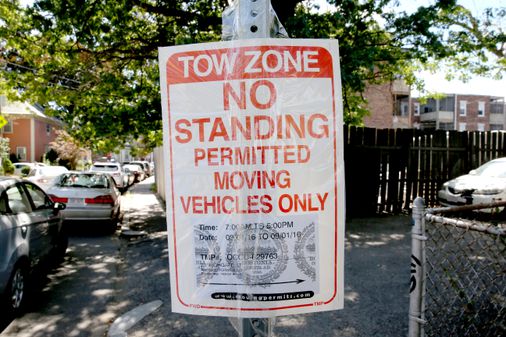
Day-Of Parking
To ensure that you have parking near your building on the day of, you’ll also want to check online with the city you’re moving to. Boston and Cambridge have varying rules, so be sure to check the correct city’s website. Online you can see if there are any existing street occupancy permits, and if not, purchase your own. While these parking permits are not required, it’s worth the $50 to guarantee that you won’t have to drag your sofa half a mile. The flights of stairs and tight corners you’re likely to face in these old buildings will be challenging enough!
Daunting though it may seem, moving to Boston and starting your graduate degree is a really exciting time! Emerson’s Off Campus Student Services have several resources – beyond just apartment listings – to help make your move as smooth as possible. You can also check out these tips from the City of Boston for links to more information about parking, where to donate discarded furniture, and other useful contacts to help with your moving process. We look forward to welcoming you home to Boston!


Hayden
Just moved into a new place and used Apartment Furniture Rentals for the first time. So glad I did! Saved time, money, and stress.